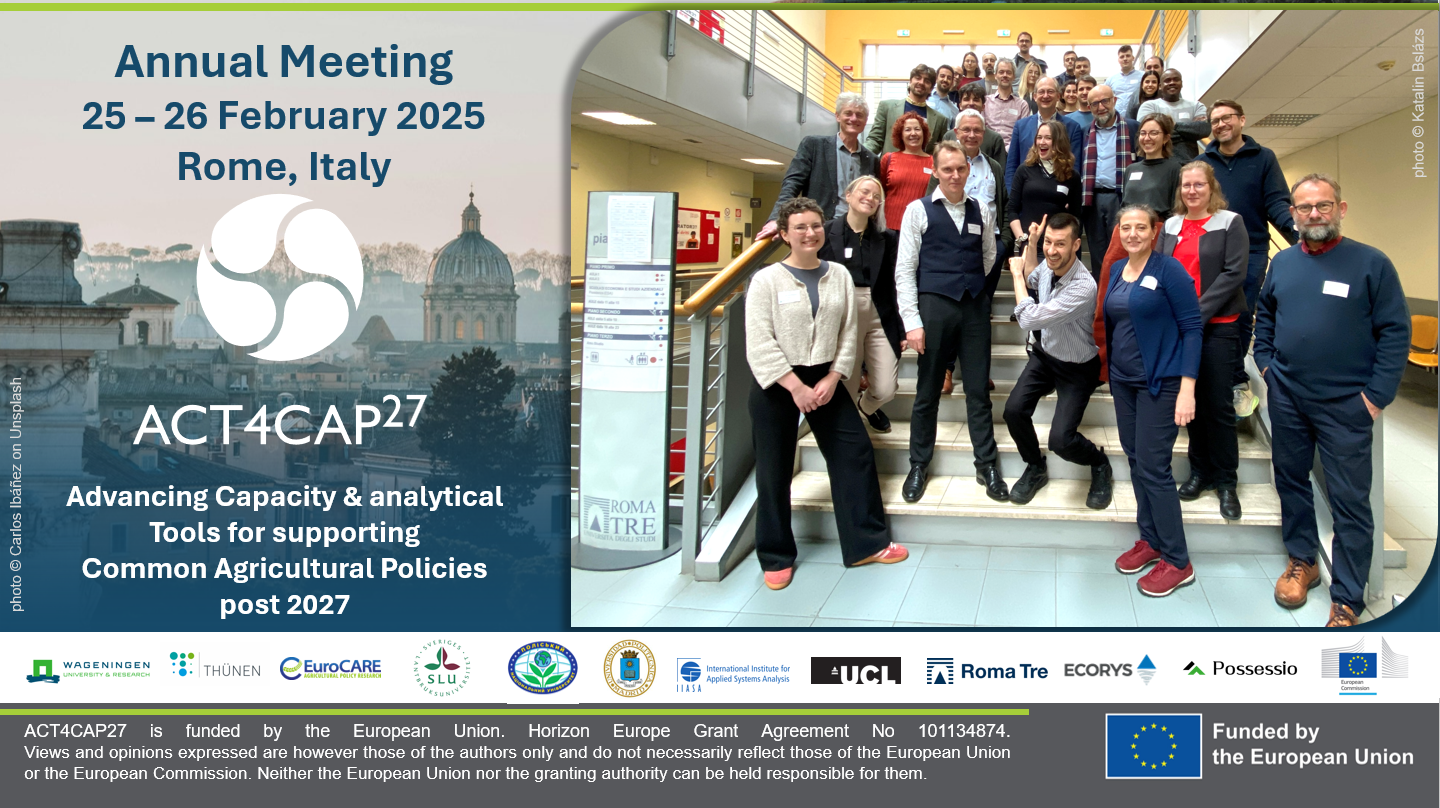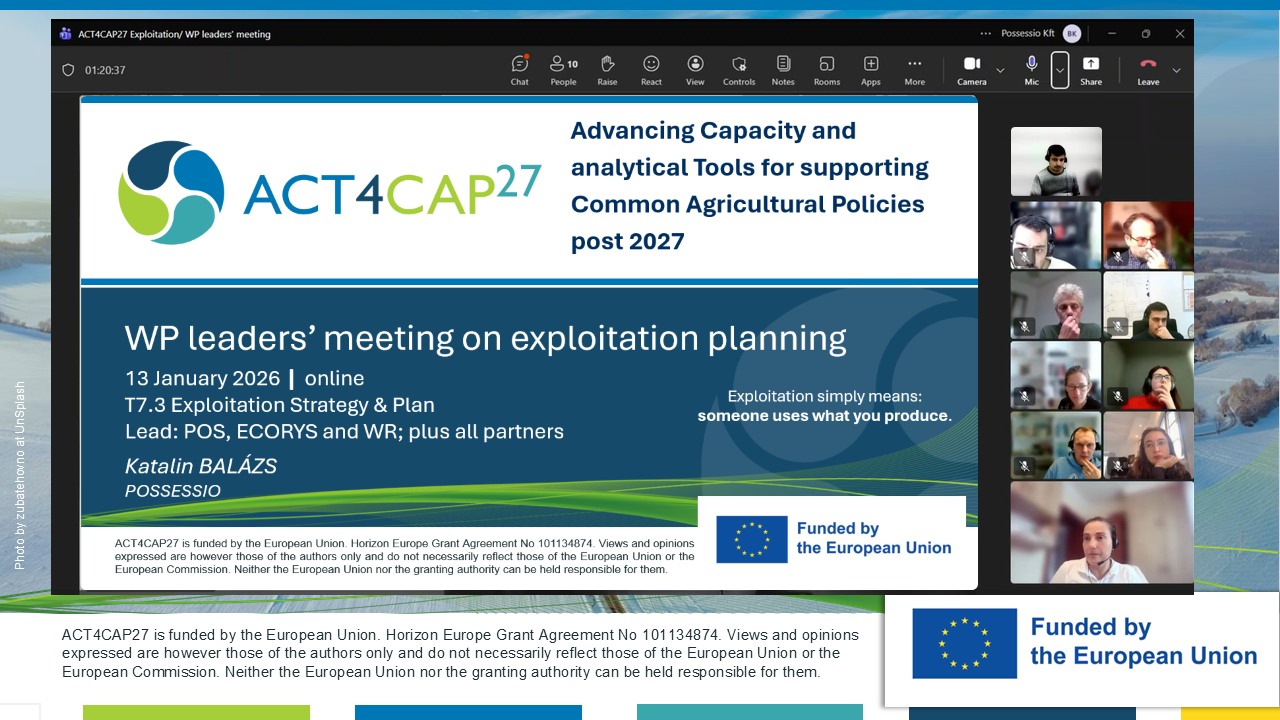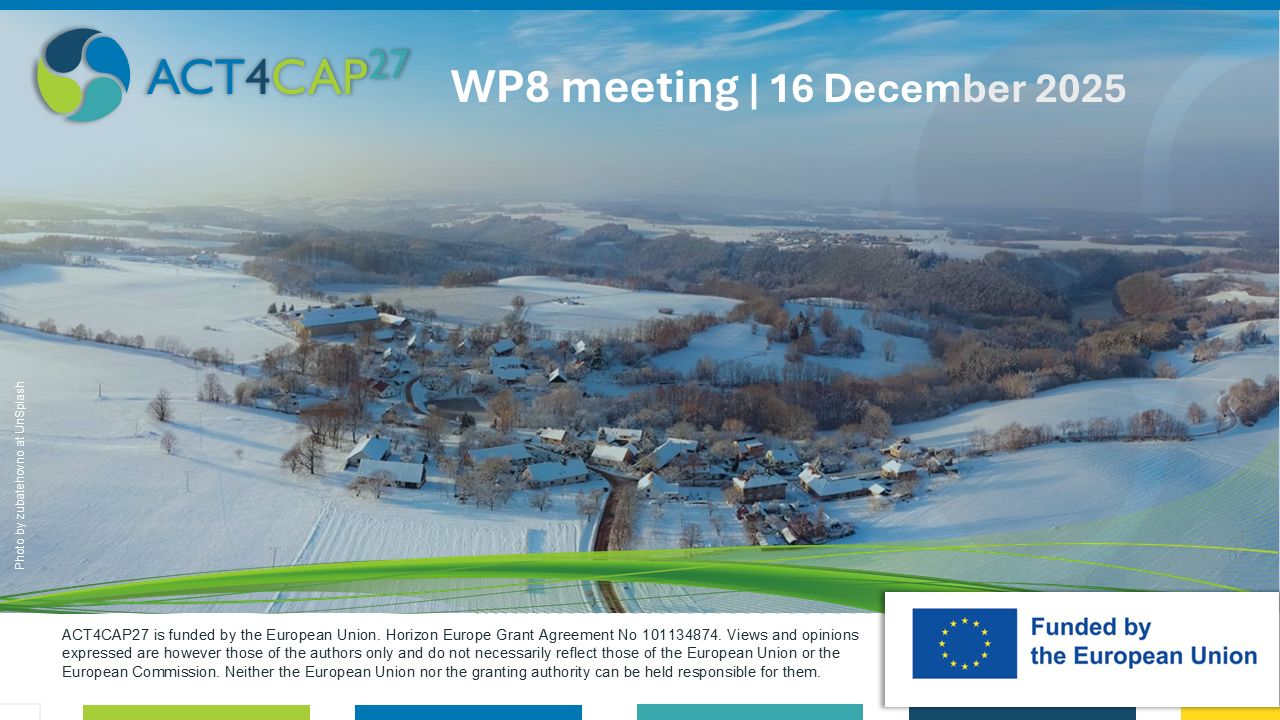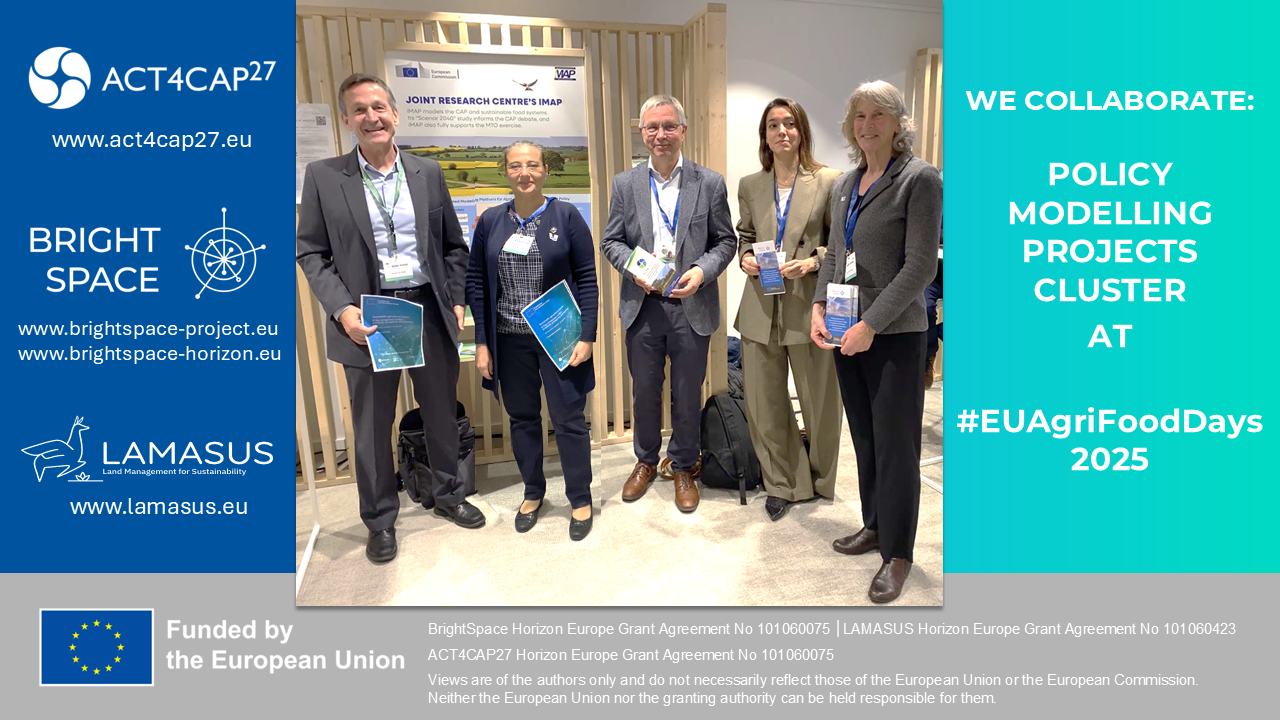On Day 2 of the ACT4CAP27 annual meeting, Torbjörn Jansson (SLU) presented Task 3.1 on developing a Harmonized Global Input Use Module. This initiative, involving SLU, WR, Thünen, EuroCARE, and IIASA, aims to standardize data on fertilizers, pesticides, and antimicrobial drug (AMD) use, covering quantities, prices, and elasticities. The task includes an organic farm module linked to AgMemod and a phased approach from stocktaking to implementation by 2028. A key discussion centered on AMD use in agriculture, its rising social costs due to resistance, and the challenges of obtaining reliable global data. The team is exploring data sources like ESVAC and Mulchandani et al. (2023) while assessing integration into models like CAPRI, GLOBIOM, and MAGNET.
Ferike Thom (Thünen) presented Task 3.2 on developing a Consumer Preference Shifts Module, which integrates survey data from EFSA and market-based consumption figures to enhance the prediction of dietary patterns. The module considers country-level and group-specific differences, such as age and income, and differentiates agricultural raw products into final commodities to improve insights into dietary shifts and sustainable consumption. A Bayesian estimation approach is being developed to balance consumption surveys, population data, agricultural production, trade flows, and food waste. The resulting database will support Task 2.1 in developing a health module and be accessible via the ACT4CAP27 Portal (WP4) for integration into CAPRI, AGMEMOD, and MAGNET. This module will also contribute to food consumption pathways and scenario-based analyses in WP6, examining shifts in consumer behavior and policy impacts like sugar taxes.
Maria Blanco (UPM), Luca Salvatici (UNIROMA3), Javier Galeano (UPM), Hans van Meijl (WSER), David Cui (WSER), and Siemen van Berkum (WSER) presented Task 3.3 on developing a Food Value Chain Module to enhance the representation of global food value chains in economic models. UPM is creating a prototype complex network model to assess the impact of agri-food policies on food system resilience and sustainability, while PNU is evaluating the sustainability of selected agricultural supply chains. UNIROMA3 and WR are improving the representation of global value chains in the CGE model MAGNET, integrating historical trade data to link past trends with future developments. Key advancements include updating the GTAP MRIO database, incorporating micro-level trade data, refining sector-to-sector trade attributions, and embedding social and environmental indicators. The enhanced model will support policy simulations for CAP scenarios, improving insights into trade disruptions, market interactions, and economic impacts.
Verena Laquai (Thünen) presented WP3 Task 4 on developing a CAP and GD policies module for future CAP policy analysis. The module builds on existing CAP models, detailing financial support, payment conditions, policy extensions, and the introduction of new CAP policies with input from WP1 and WP7. It aims to be compatible with all models, with a prototype in AGMEMOD. Key extensions include policy modeling for organic farming, food waste reduction, climate mitigation, and sustainability indicators. The project also examines Ukraine’s EU accession, national CAP Strategic Plans (CSPs) for 2023–2027, and differences in Pillar I (Direct Payments) and Pillar II (Rural Development) across member states. The module integrates data into AGMEMOD, CAPRI, and MAGNET, refining policy impact simulations by mapping CSPs, linking payments to sustainability targets, and considering regional variations in agricultural policies. A timeline from 2025 to 2028 includes implementation, monitoring, and potential expansion, ensuring adaptability to changing EU-Ukraine relations and CAP policy shifts.
Laura Van den Bossche (Ecorys) presented WP7 Task 7.1 on Stakeholder Engagement, emphasizing its importance in informing, engaging, and motivating stakeholders within ACT4CAP27. The strategy includes four in-person and four online stakeholder meetings, three thematic webinars, and a final conference to ensure alignment between model results and policy needs. A key milestone is the April 2025 online meeting, where stakeholders, including EU policymakers, agri-food chain representatives, NGOs, and researchers, will review progress on the baseline and four fast-track policy scenarios (Ukraine’s accession, Biodiversity futures, Health and nutrition, and Strategic Dialogue & CAP). The agenda includes progress updates, breakout discussions on challenges and scenario refinements, and planning for the October 2025 in-person meeting. Feedback will be gathered using Mentimeter to fine-tune engagement activities and ensure relevance.
Katalin Balázs (POSSESSIO) presented T7.2, outlining the communication (COM), dissemination (DISS), and impact strategy for ACT4CAP27. The project is legally obligated under Horizon Europe (HE) GA Articles 16 & 17 to inform, promote, and communicate its activities and results to multiple audiences, including policymakers, media, stakeholders, and citizens. Results must be made public in Open Science and disseminated via OA journal articles, conferences, and repositories. A key focus is ensuring the concrete use of project outputs through roadmaps, prototypes, software, and data-sharing. The impact strategy depends on timely engagement with policymakers for evidence-informed decision-making. The D7.2 COMDISS & Impact Strategy and Plan (due month 6) structures monitoring through quarterly partner reports, performance assessments, and biannual COMDISS meetings. Key communication channels include the project website, social media (X, LinkedIn, Bluesky), newsletters, policy briefs, Zenodo, OpenAIRE, and press releases. KPIs track engagement across various dimensions, showing some progress (e.g., Zenodo downloads exceed targets), but social media and event participation need improvement. Urgent next steps include assigning COMDISS Officers, increasing communication actions, and ensuring proper EU funding acknowledgment and Open Access compliance. The strategy also emphasizes collaboration with other Horizon projects to enhance outreach and impact.
WP5 Task 5.4 Capacity Building, presented by Maria Blanco (UPM), Michiel van Dijk (WR), and Alberto Usero (UPM), aims to increase transparency and coherence in model use, ensuring uptake of new analytical tools, improved documentation, and capacity building for assessment models. Training activities will include sessions on ACT4CAP27 models, the Agri-Food Modelling Young Researcher Network, and interactive workshops for policymakers and end users. Key training events include AGMEMOD (Oct 2024, 2025), CAPRI (Sep 2024–Feb 2025, Mar 2025), MAGNET (2025), and GLOBIOM (2025). Additionally, three summer schools (2026-2028) will focus on the Modular Toolbox for Sustainable Food System Policy Modelling, targeting PhD students, postdocs, and policymakers. The Agri-Food Modelling Young Researcher Network, inspired by BrightSpace’s AMYRN, will fund 2-3 month exchanges for young researchers.
WP8 Project Management slides by the WSER Team to be communicated online, focusing on partners’ duties related to the 1st Periodic Report covering M1-M18 (March 2024 – August 2025).
The annual meeting was concluded by project coordinators Siemen van Berkum and Hans van Meijl.
We thank to Prof. Luca Salvatici and the whole UniRoma3 Team for the local organisation of the annual meeting and providing an ambient and relaxing atmosphere to our fruitful discussions for the continued smooth implementation of the ACT4CAP27 project.




